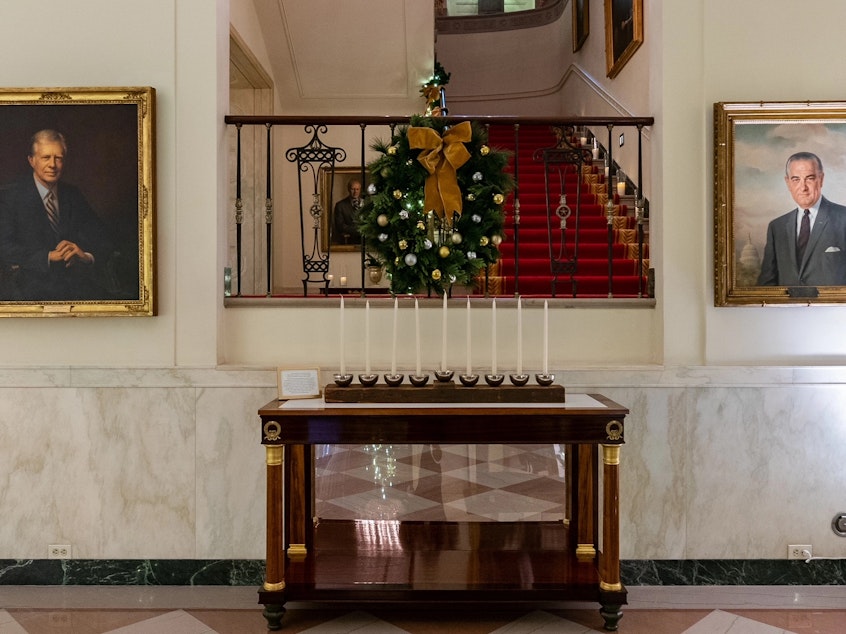As the Bidens mark Hanukkah, the White House gets its own menorah for the first time

This year, to celebrate the ancient Jewish festival of lights, the White House added a menorah to its holiday lineup for the first time.
The nine-pronged candelabra was created by the Executive Residence Carpentry Shop out of wood removed from the building in 1950 during a Truman-era renovation, the White House says.
It now sits in Cross Hall, between portraits of former presidents Jimmy Carter and Lyndon Johnson, as part of this year's "We The People"-themed holiday display. The White House welcomes roughly 50,000 visitors each holiday season, in addition to offering virtual tours of the decorations.
President Joe Biden and First Lady Jill Biden are set to add the menorah to the permanent White House collection at a Hanukkah reception Monday evening, which will mark the first time a Jewish artifact is added to the White House archives, according to the White House.
Various menorahs of special significance have been loaned to the White House over the years, the Hill reports.
Sponsored
A 2007 event included the parents of murdered Wall Street Journal reporter Daniel Pearl and a menorah that had belonged to his great-grandfather, and in 2020 then-President Barack Obama lit candles on a menorah that had been recovered from a Louisiana synagogue hit by Hurricane Katrina.
It's one of several ways the Biden administration is marking the holiday
The Biden administration marked the first night of Hanukkah on Sunday by publicly denouncing antisemitism after a rise in troubling incidents and hate speech. U.S. Attorney General Merrick Garland, who is himself Jewish, lit the National Menorah on the White House Ellipse.
"Together, we must stand up against the disturbing rise in antisemitism. And together, we must stand up against bigotry in any of its forms. Our democracy depends on it," he said, according to CNN. "As a descendant of those who fled persecution because they were Jewish, it is especially meaningful to be here tonight as we light this menorah in our nation's capital and under the protection of its laws."
The White House points to other actions that Biden has taken to support the Jewish community, from convening a summit to combat hate-fueled violence to forming an antisemitism task force to securing the largest-ever increase in federal funding for the physical security of nonprofits, including synagogues and Jewish Community Centers.
Sponsored
Monday night's Hanukkah reception will include a blessing and menorah lighting, with special guests including Holocaust survivor Bronia Brandman, Rabbi Charlie Cytron-Walker (who was among the hostages held at a Texas synagogue earlier this year) and Avigael Heschel-Aronson, the granddaughter of Rabbi Abraham Joshua Heschel.
The White House says that Biden's remarks will "make the case that in the face of emboldened antisemitism in the U.S. and around the world, silence is complicity — and we must forcefully say that all forms of hate, antisemitism, and violence can have no safe harbor in America."
A brief history of White House Hanukkahs
The first president to mark Hanukkah in the nation's capital was Carter, who lit what would come to be known as "the National Menorah" in nearby Lafayette Park in 1979.
Hanukkah officially arrived in the White House a decade later, when President George H.W. Bush displayed a menorah (given to him by the Synagogue Council of America) in the building. Bill Clinton became the first president to actually light a menorah in the people's house in a small ceremony in 1993 (at which a young student's hair famously and briefly caught fire).
Sponsored
President George W. Bush and First Lady Laura Bush hosted the first White House Hanukkah party in 2001, lighting a 100-year-old menorah borrowed from the Jewish Museum in New York.
Second gentleman Doug Emhoff led the menorah lighting at last year's Hanukkah party, which Biden called a White House tradition that was newly "a family tradition" as well.
And this year, the president and first lady hosted the first-ever High Holiday reception at the White House in September. [Copyright 2022 NPR]

